 Petzlover
Petzlover Bavarian Mountain Hound is originated from Germany but Cesky Terrier is originated from Czech Republic. Bavarian Mountain Hound may grow 25 cm / 10 inches higher than Cesky Terrier. Bavarian Mountain Hound may weigh 15 kg / 34 pounds more than Cesky Terrier. Both Bavarian Mountain Hound and Cesky Terrier has almost same life span. Bavarian Mountain Hound may have more litter size than Cesky Terrier. Both Bavarian Mountain Hound and Cesky Terrier requires Moderate Maintenance.
Bavarian Mountain Hound is originated from Germany but Cesky Terrier is originated from Czech Republic. Bavarian Mountain Hound may grow 25 cm / 10 inches higher than Cesky Terrier. Bavarian Mountain Hound may weigh 15 kg / 34 pounds more than Cesky Terrier. Both Bavarian Mountain Hound and Cesky Terrier has almost same life span. Bavarian Mountain Hound may have more litter size than Cesky Terrier. Both Bavarian Mountain Hound and Cesky Terrier requires Moderate Maintenance.
 The Bavarian Mountain Hound was originally bred mixing the Bavarian Hound and the Hanover Hound. They decided to mix these breeds in a hope that the new breed will have the best of the parents. Actually, it turned out better than they could even imagine, since they created a great family dog, with magnificent stamina, quiet temperament and supersensitive nose that made them great hunters.
The Bavarian Mountain Hound was originally bred mixing the Bavarian Hound and the Hanover Hound. They decided to mix these breeds in a hope that the new breed will have the best of the parents. Actually, it turned out better than they could even imagine, since they created a great family dog, with magnificent stamina, quiet temperament and supersensitive nose that made them great hunters.
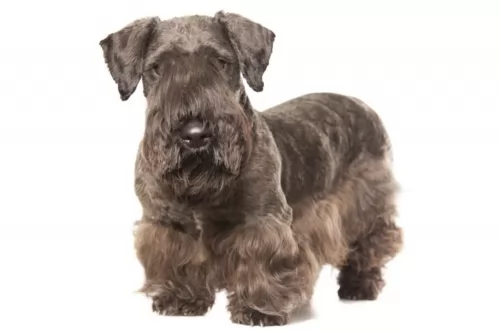 Known as the Bohemian Terrier and looking similar to a Scottish Terrier dog, the Cesky Terrier is a dog breed that has been created by Frantisek Horak, in the Czech Republic.
Known as the Bohemian Terrier and looking similar to a Scottish Terrier dog, the Cesky Terrier is a dog breed that has been created by Frantisek Horak, in the Czech Republic.
Horak wanted to breed a type of hunting dog, and in 1949, using both the Scottish Terrier ad the Sealyham Terrier, he bred the two, creating a new breed that would hopefully be a stronger hunting dog.
The Cesky Terrier was shown for the first time in 1959 and was recognized by the Federation Cynologique Internationale in 1963 and in 1993 by the United Kennel Club. It’s a rare dog this, and is the national dog of the Czech Republic.
 The Bavarian Mountain Hound is a medium sized breed of a dog. They have larger bones, but there is a very low risk of obesity. This is a very active dog, with a very muscular body. Their bone structure defines in a wide chest, and their back legs set a little bit higher than the front legs. They have strong necks and pear-shaped heads. They have strong jaws, ideal for a hunting dog. They are very specific because of their big brown eyes. The Bavarian Mountain Hound is a perfect pet. First of all, he is not a pack dog. He gets attached to his family and he is not very friendly with strangers. If they are trained well, they will never attack a stranger but they will bark and let you know that something isn’t right.
The Bavarian Mountain Hound is a medium sized breed of a dog. They have larger bones, but there is a very low risk of obesity. This is a very active dog, with a very muscular body. Their bone structure defines in a wide chest, and their back legs set a little bit higher than the front legs. They have strong necks and pear-shaped heads. They have strong jaws, ideal for a hunting dog. They are very specific because of their big brown eyes. The Bavarian Mountain Hound is a perfect pet. First of all, he is not a pack dog. He gets attached to his family and he is not very friendly with strangers. If they are trained well, they will never attack a stranger but they will bark and let you know that something isn’t right.
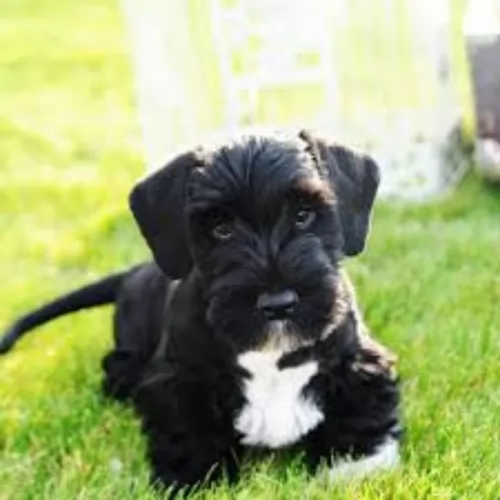 The Cesky Terrer is a longish dog, much like the Scottie and he also has short legs. He is roughly 29ck in height at the withers, is about 43cm in length and weighs anything from 5 to 10kg.
The Cesky Terrer is a longish dog, much like the Scottie and he also has short legs. He is roughly 29ck in height at the withers, is about 43cm in length and weighs anything from 5 to 10kg.
The coat of this dog is long, silky and quite wavy and can be in a number of different shades of gray or a light brown color. Puppies are born black. The soft coat can be kept groomed by clippers or you can take him to have his coat professionally trimmed.
This dog breed has natural drop ears, unlike the Scottie which has erect ears. The tail length is 18-20 cm and low set.
A loyal, quiet and loving family dog, the Cesky Terrier will get on well with children in the home and he is also friendly with other dogs. Just like with any other dog, it will be important to socialize the dog breed at an early age as then he becomes obedient, smart and relaxed. He is a breed which is also easy to train. He also makes a good watchdog.
 Special talents: Since the Bavarian Mountain Hound is born with a strong scent, they are great for hunting. They can be trained to be search dogs.
Special talents: Since the Bavarian Mountain Hound is born with a strong scent, they are great for hunting. They can be trained to be search dogs.
If you live slow and quiet life indoors, maybe the Bavarian Mountain Hound is not the best choice for you. They are a calm breed, they do not bark a lot, but they need daily outdoor activity. They usually get attached to the owner, but in case you raise this dog in a family, they will be attached to adults and the children. They are very good while playing and living with the children, but if you usually have a lot of other children or strangers in a house, he will adapt to that kind of social life very easy.
It is very important that you start an early socialization of your Bavarian Mountain Hound. In situations where you raise this breed without the social life, they will have difficulties when they find themselves in situations with other animals. If you raise this breed with other animals in the same home, they will learn to play with other dogs, cats etc.
Bavarian Mountain Hound is not easy to train because they get easy distracted with smelling something more interesting than listening to your commands. It is not advised to have this breed as your first pet because they need an experienced trainer with a lot of patience and understanding.
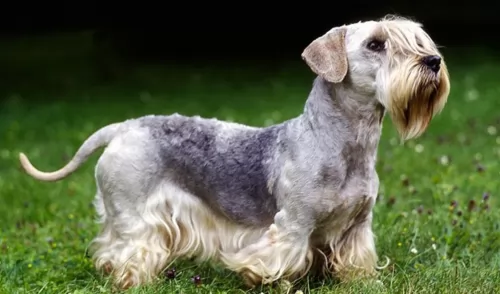 The Cesky Terrier isn’t a small-dog yapper and he will adapt to life in the city or the country. He is a small dog, but he is feisty and sporty and will willingly join you with your jogging or when you go on a walk.
The Cesky Terrier isn’t a small-dog yapper and he will adapt to life in the city or the country. He is a small dog, but he is feisty and sporty and will willingly join you with your jogging or when you go on a walk.
He is intelligent and playful and when you add in characteristics such as being courageous, loving, loyal and feisty, you can see that the Cesky Terrier is guaranteed to make a super family pet.
 The Bavarian Mountain Hound is a quiet type of the dog. They don’t ask for a lot of attention and even if they develop some health issues you will have a hard time finding it out. So, the regular vet checks are a necessity. They usually suffer from an ear infection. The vet will usually check for a hip or an elbow dysplasia since those diseases occur with highly active breeds. Some irritations with eyelids are also found in the medical history of this breed but they are generally very rare.
The Bavarian Mountain Hound is a quiet type of the dog. They don’t ask for a lot of attention and even if they develop some health issues you will have a hard time finding it out. So, the regular vet checks are a necessity. They usually suffer from an ear infection. The vet will usually check for a hip or an elbow dysplasia since those diseases occur with highly active breeds. Some irritations with eyelids are also found in the medical history of this breed but they are generally very rare.
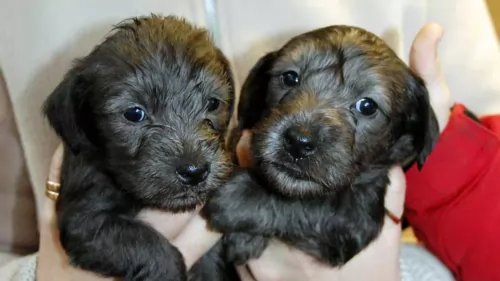 The Cesky Terrier is generally a healthy dog, but this breed sometimes suffers from common dog ailments that other breeds also have to contend with.
The Cesky Terrier is generally a healthy dog, but this breed sometimes suffers from common dog ailments that other breeds also have to contend with.
Eye disorders, ear infections, pancreatitis, hip dysplasia and weight gain are just some health issues you might need to be aware of.
Remember that if you want to promote a healthier dog, feeding him a quality diet and taking him immediately to the vet when you suspect a problem can keep him free from common dog illnesses.
Pancreatitis for instances develops when the pancreas becomes inflamed, and this can be brought on by allowing your pet to become obese. There are other reasons for pancreatitis too such as infection. You will see diarrhea, fever and vomiting with your pet as well as discomfort from abdominal pain. It’s a disease which affects smaller dogs more often than larger breeds.
 There is a big difference in feeding the Bavarian Mountain Hound since you can raise him to be a pet or a dog for hunting. If you decided to keep this breed as a pet, they will do just fine with one of the dry foods that are good quality. If you want to raise them as a hunting dog, an active dog, then they will need a high-quality dry food and occasionally some raw minced meat.
There is a big difference in feeding the Bavarian Mountain Hound since you can raise him to be a pet or a dog for hunting. If you decided to keep this breed as a pet, they will do just fine with one of the dry foods that are good quality. If you want to raise them as a hunting dog, an active dog, then they will need a high-quality dry food and occasionally some raw minced meat.
High-quality food for puppies with a lot of nutrients that will help in growing the healthy bones and beautiful coat.
Since they have a short coat, the Bavarian Mountain Hounds don’t need a regular or any special kind of grooming. They will do just fine with occasional brushing. They don’t shed a lot, but in a season when they do you are free to brush them more regularly. They enjoy the brushings, cuddles, scratching, belly rubs - they are very lovable breed. But, as advised, take them to regular vet check because they can be very quiet even when they feel the pain.
The Bavarian Mountain Hound has a gene of a working dog and that is the reason why they need a lot of the activity on a daily basis. No matter if you take him to walk, run or a bike ride, they will love it. They do not like being on the leash since they love to use their nose to play. If you socialise them well, the dog park will be a great thing for them.
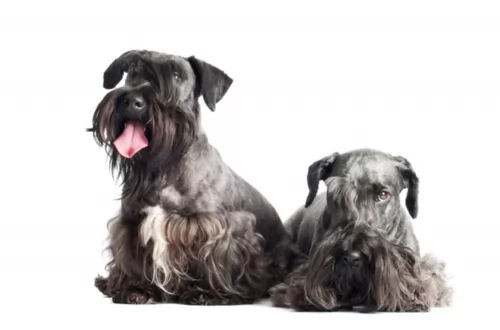 Cesky Terriers may well be a little bit less active and quieter than other terriers, but they will still need a good dose of exercise. He loves to dig, and if he is bored and doesn’t have a plenty of exercise and games, he will want to dig more and cause the owner a lot of frustration. Take him for daily walks and give him some ball games in the garden.
Cesky Terriers may well be a little bit less active and quieter than other terriers, but they will still need a good dose of exercise. He loves to dig, and if he is bored and doesn’t have a plenty of exercise and games, he will want to dig more and cause the owner a lot of frustration. Take him for daily walks and give him some ball games in the garden.
Cesky Terriers will need brushing down at least twice a week and their coats will need to be trimmed into shape every 8 to 10 weeks or so. You’ll also need to check excess hair inside the ears.
As with any dog breed, you will need to check on his nails so that they don’t grow too long and also brush his teeth 2 or 3 times a week to avoid dental disease.